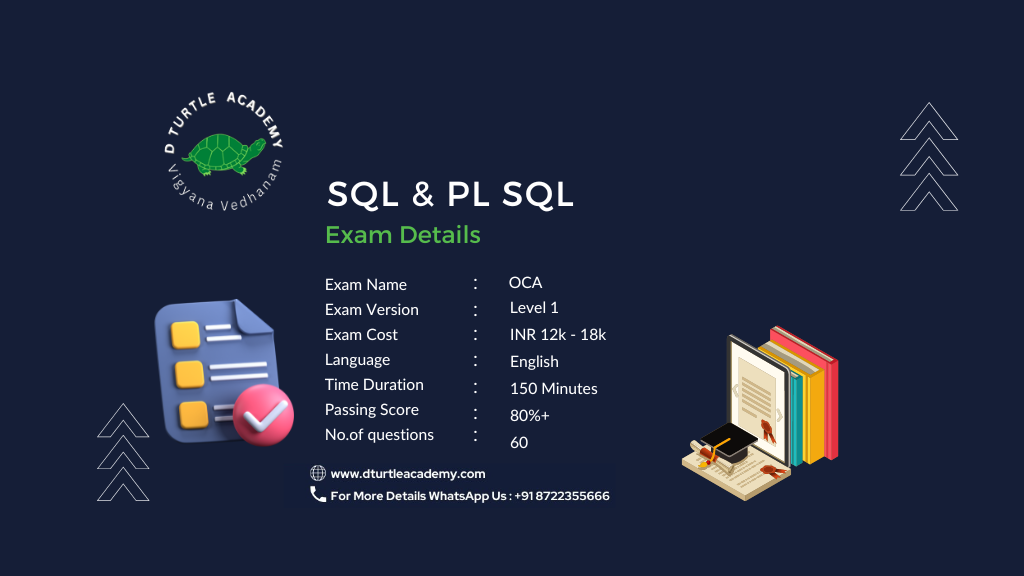SQL and PL SQL Course in Bangalore
with
100% Placement Assistance
- Job oriented Training
- Expert Trainers with 15+ years Exp
- Interview Questions
SQL and PL SQL Course in Bangalore - New Batch Details
| Trainer Name | Mr. Dhiraj |
| Trainer Experience | 15+ Years |
| Next Batch Date | 22-02-2023 (8:00AM IST) |
| Training Modes: | Classroom Training, Online Training (Instructor Led) |
| Course Duration: | 1 Month |
| Call us at: | +91 87223 55666 |
| Email Us at: | dturtleacademy@gmail.com |
| Demo Class Details: | ENROLL FOR A FREE DEMO CLASS |
SQL and PL SQL Course in Bangalore - Curriculum
- Features of Oracle Database 11g
- Basic design, theoretical, and physical aspects of a relational database
- Different types of SQL statements
- Data set
- Database using SQL Developer environment
- Save queries to files and use script files in SQL Developer
- Basic SELECT Statement
- Selecting All Columns
- Selecting Specific Columns
- Writing SQL Statements
- Column Heading Defaults
- Arithmetic Expressions
- Using Arithmetic Operators
- Operator Precedence
- Using Parentheses
- Defining a Null Value
- Null Values in Arithmetic Expressions
- Defining a Column Alias
- Using Column Aliases
- Concatenation Operator
- Using the Concatenation Operator
- Literal Character Strings
- Using Literal Character Strings
- Duplicate Rows
- Eliminating Duplicate Rows
- Limiting Rows Using a Selection
- Limiting the Rows Selected
- Using the WHERE Clause
- Character Strings and Dates
- Comparison Conditions
- Using Comparison Conditions
- Other Comparison Conditions
- Using the BETWEEN Condition
- Using the IN Condition
- Using the LIKE Condition
- Using the NULL Conditions
- Logical Conditions
- Using the AND Operator
- Using the OR Operator
- Using the NOT Operator
- Rules of Precedence
- ORDER BY Clause
- Sorting in Descending Order
- Sorting by Column Alias
- Sorting by Multiple Columns
- SQL Function
- Two Types of SQL Functions
- Single-Row Functions
- Single-Row Functions
- Character Functions
- Character Functions
- Case Manipulation Functions
- Using Case Manipulation Functions
- Character-Manipulation Functions
- Using the Character-Manipulation Functions
- Number Functions
- Using the ROUND Function
- Using the TRUNC Function
- Using the MOD Function
- Working with Dates
- Arithmetic with Dates
- Using Arithmetic Operators with Dates
- Date Functions
- Using Date Functions
- Practice 3, Part One:
- Conversion Functions
- Implicit Data Type Conversion
- Explicit Data Type Conversion
- Using the TO_CHAR Function with Dates
- Elements of the Date Format Model
- Using the TO_CHAR Function with Dates
- Using the TO_CHAR Function with Numbers
- Using the TO_NUMBER and TO_DATE Functions
- RR Date Format
- Example of RR Date Format
- Nesting Functions
- General Functions
- NVL Function
- Using the NVL Function
- Using the NVL2 Function
- Using the NULLIF Function
- Using the COALESCE Function
- Conditional Expressions
- The CASE Expression
- Using the CASE Expression
- The DECODE Function
- Using the DECODE Function
- Obtaining Data from Multiple Tables
- Cartesian Products
- Generating a Cartesian Product
- Types of Joins
- Joining Tables Using Oracle Syntax
- What is an Equijoin?
- Retrieving Records with Equijoins
- Additional Search Conditions Using the AND Operator
- Qualifying Ambiguous Column Names
- Using Table Aliases
- Joining More than Two Tables
- Non-Equijoins
- Retrieving Records with Non-Equijoins
- Outer Joins Outer Joins Syntax
- Using Outer Joins
- Self Joins
- Joining a Table to Itself
- Joining Tables Using SQL: 1999 Syntax
- Creating Cross Joins
- Creating Natural Joins
- Retrieving Records with Natural Joins
- Creating Joins with the USING Clause
- Retrieving Records with the USING Clause
- Creating Joins with the ON Clause
- Retrieving Records with the ON Clause
- Creating Three-Way Joins with the ON Clause
- What Are Group Functions?
- Types of Group Functions
- Group Functions Syntax
- Using the AVG and SUM Functions
- Using the MIN and MAX Functions
- Using the COUNT Function
- Using the DISTINCT Keyword
- Group Functions and Null Values
- Using the NVL Function with Group Functions
- Creating Groups of Data
- Creating Groups of Data: The GROUP BY Clause Syntax
- Using the GROUP BY Clause
- Grouping by More Than One Column
- Using the GROUP BY Clause on Multiple Columns
- Illegal Queries Using Group Functions
- Excluding Group Results
- Excluding Group Results: The HAVING Clause
- Using the HAVING Clause
- Nesting Group Functions
- Subqueries
- Objectives
- Using a Subquery to Solve a Problem
- Subquery Syntax
- Using a Subquery
- Guidelines for Using Subqueries
- Types of Subqueries
- Single-Row Subqueries
- Executing Single-Row Subqueries
- Using Group Functions in a Subquery
- The HAVING Clause with Subqueries
- What is Wrong with this Statement?
- Will this Statement Return Rows?
- Multiple-Row Subqueries
- Using the ANY Operator in Multiple-Row Subqueries
- Using the ALL Operator in Multiple-Row Subqueries
- Null Values in a Subquery
- Data Manipulation Language
- Adding a New Row to a Table
- The INSERT Statement Syntax 8-5
- Inserting New Rows
- Inserting Rows with Null Values
- Inserting Special Values
- Inserting Specific Date Values
- Creating a Script
- Copying Rows from Another Table
- Changing Data in a Table
- The UPDATE Statement Syntax
- Updating Rows in a Table
- Updating Two Columns with a Subquery
- Updating Rows Based on Another Table
- Updating Rows: Integrity Constraint Error
- Removing a Row from a Table
- The DELETE Statement
- Deleting Rows from a Table
- Deleting Rows Based on Another Table
- Deleting Rows: Integrity Constraint Error
- Using a Subquery in an INSERT Statement
- Using the WITH CHECK OPTION Keyword on DML Statements
- Overview of the Explicit Default Feature
- Using Explicit Default Values
- The MERGE Statement
- The MERGE Statement Syntax
- Merging Rows
- Database Transactions
- Advantages of COMMIT and ROLLBACK Statements
- Controlling Transactions
- Rolling Back Changes to a Marker
- Implicit Transaction Processing
- State of the Data Before COMMIT or ROLLBACK
- State of the Data after COMMIT
- Committing Data
- State of the Data After ROLLBACK
- Statement-Level Rollback
- Read Consistency
- Implementation of Read Consistency
- Locking
- Implicit Locking
- Read Consistency Example
- Database Objects
- Naming Rules
- The CREATE TABLE Statement
- Referencing Another User?s Tables
- The DEFAULT Option
- Creating Tables
- Tables in the Oracle Database
- Querying the Data Dictionary 9-10
- Data Types
- DateTime Data Types
- TIMESTAMP WITH TIME ZONE Data Type
- TIMESTAMP WITH LOCAL TIME Data Type
- INTERVAL YEAR TO MONTH Data Type
- INTERVAL DAY TO SECOND Data Type
- Creating a Table by Using a Subquery Syntax
- Creating a Table by Using a Subquery
- The ALTER TABLE Statement
- Adding a Column
- Modifying a Column
- Dropping a Column
- The SET UNUSED Option
- Dropping a Table
- Changing the Name of an Object
- Truncating a Table
- Adding Comments to a Table
- What are Constraints?
- Constraint Guidelines
- Defining Constraints
- The NOT NULL Constraint
- The UNIQUE Constraint
- The PRIMARY KEY Constraint
- The FOREIGN KEY Constraint
- FOREIGN KEY Constraint Keywords
- The CHECK Constraint
- Adding a Constraint Syntax
- Adding a Constraint
- Dropping a Constraint
- Disabling Constraints
- Enabling Constraints
- Cascading Constraints
- Viewing Constraints
- Viewing the Columns Associated with Constraints
- Database Objects
- What is a View?
- Why use Views?
- Simple Views and Complex Views
- Creating a View
- Retrieving Data from a View
- Querying a View
- Modifying a View
- Creating a Complex View
- Rules for Performing DML Operations on a View
- Using the WITH CHECK OPTION Clause
- Denying DML Operations
- Database Objects
- What is a Sequence?
- The CREATE SEQUENCE Statement Syntax
- Creating a Sequence
- Confirming Sequences
- NEXTVAL and CURRVAL Pseudocolumns
- Using a Sequence
- Modifying a Sequence
- Guidelines for Modifying a Sequence
- Removing a Sequence
- What is an Index?
- How Are Indexes Created?
- Creating an Index
- When to Create an Index
- When Not to Create an Index
- Confirming Indexes
- Function-Based Indexes
- Removing an Index
- Creating and Removing Synonyms
- Objectives
- Controlling User Access
- Privileges
- System Privileges
- Creating Users
- User System Privileges
- Granting System Privileges
- What is a Role?
- Creating and Granting Privileges to a Role
- Changing Your Password
- Object Privileges
- Granting Object Privileges
- Using the WITH GRANT OPTION and PUBLIC Keywords
- Confirming Privileges Granted
- How to Revoke Object Privileges
- Revoking Object Privileges
- Database Links
- What Is a Subquery?
- Subqueries
- Using a Subquery
- Multiple-Column Subqueries
- Column Comparisons
- Pairwise Comparison Subquery
- Nonpairwise Comparison Subquery
- Using a Subquery in the FROM Clause
- Scalar Subquery Expressions
- Scalar Subqueries: Examples
- Correlated Subqueries
- Using Correlated Subqueries
- Using the EXISTS Operator
- Using the NOT EXISTS Operator
- Correlated UPDATE
- Correlated DELETE
- The WITH Clause
- WITH Clause: Example
- Hierarchical Retrieval
- Sample Data from the EMPLOYEES Table
- Natural Tree Structure
- Review of the INSERT Statement
- Review of the UPDATE Statement
- Overview of Multitable INSERT Statements
- Overview of Multitable INSERT Statements
- Types of Multitable INSERT Statements
- Multitable INSERT Statements
- Unconditional INSERT ALL
- Conditional INSERT ALL
- Conditional FIRST INSERT
- Pivoting INSERT
- External Tables
- Creating an External Table
- Example of Creating an External Table
- Querying External Tables
- CREATE INDEX with CREATE TABLE Statement
- Performing Essential PL/SQL Tasks
- Calling PL/SQL from Other Languages
- Language Fundamentals
- PL/SQL Block Structure
- The PL/SQL Character Set
- Identifiers
- Literals
- The Semicolon Delimiter
- Comments
- The PRAGMA Keyword
- Labels
- The Simple Loop
- The WHILE Loop
- The Numeric FOR Loop
- The Cursor FOR Loop
- Loop Labels
- Tips for Iterative Processing
- Exception-Handling Concepts and Terminology
- Defining Exceptions
- Raising Exceptions
- Handling Exceptions
- Building an Effective Error Management Architecture
- Making the Most of PL/SQL Error Management
- String Datatypes
- Working with Strings
- String Function Quick Reference
- Numeric Datatypes
- Number Conversions
- Numeric Functions
- Records in PL/SQL
- Collections Overview
- Collection Methods (Built-Ins)
- Working with Collections
- Nested Table Multiset Operations
- The BOOLEAN Data Type
- The RAW Datatype
- The UROWID and ROWID Data Types
- The LOB Datatypes
- Working with LOBs
- Predefined Object Types
- Cursor Basics
- Working with Implicit Cursors
- Working with Explicit Cursors
- BULK COLLECT
- SELECT … FOR UPDATE
- Cursor Variables and REF CURSORs
- Cursor Expressions
- Procedures
- Functions
- Parameters
- Local Modules
- Module Overloading
- Forward Declarations
- Advanced Topics
- Why Packages?
- Rules for Building Packages
- Rules for Calling Packaged Elements
- Working with Package Data
- When to Use Packages
- Packages and Object Types
- DML Triggers
- DDL Triggers
- Database Event Triggers
- INSTEAD OF Triggers
- AFTER SUSPEND Triggers
- Maintaining Triggers
- Managing Code in the Database
- Using Native Compilation
- Using the Optimizing Compiler and Compile-Time Warnings
- Conditional Compilation
- Testing PL/SQL Programs
- Debugging PL/SQL Programs
- Tuning PL/SQL Programs
- Protecting Stored Code
- Displaying Information
- Reading and Writing Files
- Sending Email
- Working with Web-Based Data (HTTP)
- Other Types of I/O Available in PL/SQL
Key Features of SQL and PL SQL Course in Bangalore
- D Turtle Institute's SQL & PL SQL training covers all essential topics needed to become proficient in database management.
- The training is designed to provide hands-on experience in writing SQL queries and developing PL/SQL programs.
- Experienced trainers at D Turtle Institute offer personalized attention to each student to ensure their understanding of concepts.
- The institute's training program includes practical assignments and projects to help students gain real-world experience.
- D Turtle Institute provides flexible schedules for the training program, making it convenient for working professionals.
- The training program is highly interactive, with group discussions, Q&A sessions, and live examples to enhance the learning experience.
- Students receive certification upon completion of the training, demonstrating their competency in SQL and PL/SQL.
- D Turtle Institute's SQL & PL SQL training program has a high success rate, with many students successfully finding jobs in the field after completion.
Why Choose us for SQL & PL SQL Course?
Expert Trainers
Expert Trainers
D Turtle Institute employs experienced trainers who are experts in their respective fields. They have hands-on experience in using SQL & PL SQL in real-world scenarios and can offer practical guidance to students.
Personalized Attention
Personalized Attention
The trainers at D Turtle Institute provide personalized attention to each student, ensuring that they understand the concepts and can apply them in real-world scenarios.
Hands-on Training
Hands-on Training
D Turtle Institute provides hands-on training to students, enabling them to gain practical experience in writing SQL queries and developing PL/SQL programs.
Flexible Schedules
Flexible Schedules
The training program at D Turtle Institute is flexible, with options for both full-time and part-time schedules, making it convenient for working professionals.
Comprehensive Curriculum
Comprehensive Curriculum
The training program at D Turtle Institute covers all essential topics related to SQL & PL SQL, including data modeling, SQL commands, stored procedures, triggers, and more.
Certification
Certification
Students receive certification upon completion of the training program, demonstrating their competency in SQL and PL/SQL.
Interactive Learning Environment
Interactive Learning Environment
The training program at D Turtle Institute is highly interactive, with group discussions, Q&A sessions, and live examples to enhance the learning experience.
High Success Rate
High Success Rate
The training program at D Turtle Institute has a high success rate, with many students successfully finding jobs in the field after completion.
Lifetime student portal access
Lifetime student portal access
Our course enrollers can now get premium access to our SQL & PL SQL study guides, customized course content pdf, curated LMS, You will have 24/7 free access to this student portal, which will help you revise and learn the course as many times as you want.
Benefits of SQL & PL SQL
Efficient Data Management
SQL & PL SQL enable efficient management of large volumes of data, making it easy to store, retrieve, and modify data as required.
Scalability
SQL & PL SQL are scalable, meaning they can handle a large number of users and large volumes of data with ease.
Faster Data Retrieval
SQL & PL SQL can retrieve data quickly, reducing the time taken to perform data-related tasks.
Improved Data Security
SQL & PL SQL provide robust data security features, including encryption and user access controls, helping to protect sensitive data.
Automation of Tasks
PL SQL enables the automation of tasks, making it easy to schedule and execute complex database operations.
Integration with Other Technologies
SQL & PL SQL integrate with other technologies such as Java, XML, and .NET, making it easy to build applications that rely on databases.
Services
Classroom Training
Classroom Training
D Turtle Institute provides in-person classroom training at our location in Bangalore, India, with experienced trainers and interactive learning sessions.
Online Training
Online Training
We offers online training programs to students for SQL & PL SQL, where learners can attend classes remotely from anywhere in the world.
Corporate Training
Corporate Training
We provides customized training programs for corporations to meet their specific needs, with training delivered either on-site or online.
Placement Program
Placement Program
D Turtle Institute offers placement assistance to students who complete their training program, with help finding suitable job opportunities in the field.
Project Training
Project Training
D Turtle Institute provides project-based training to help students gain practical experience in using SQL & PL SQL in real-world scenarios.
Pre-Recorded Videos
Pre-Recorded Videos
D Turtle Institute offers pre-recorded video lectures and tutorials that students can access anytime, anywhere, to enhance their learning experience.
Our Students Feedback









About SQL and PL SQL Course in Bangalore
SQL (Structured Query Language) is a programming language used to manage and manipulate data stored in relational databases. It provides a set of commands and functions that allow users to insert, update, delete, and query data in a database.
PL SQL (Procedural Language/Structured Query Language) is an extension of SQL that allows users to write procedural code in addition to SQL commands. PL SQL is used to develop database applications and automate database management tasks.
Together, SQL and PL SQL form a powerful combination that can help businesses manage their data effectively, increase productivity, and reduce errors.
SQL and PL SQL Course in Bangalore at D Turtle Institute is a comprehensive program designed to help individuals gain expertise in database management. The training program covers all the essential concepts of SQL & PL SQL, including data manipulation, transaction control, and database design, among others.
D Turtle Institute’s SQL and PL SQL Course in Bangalore offers students a holistic learning experience that can help them build a successful career in database management.
Our SQL & PL SQL course completion certificate is ideal for both beginners as well as working professionals who want to gain training skills in the field of SQL & PL SQL.
We also provide you guaranteed placement assistance and training with real-time projects to upskill themselves to help you to achieve your ideal job with our range of courses.
Enroll with our D Turtle Academy for the best SQL & PL SQL course in Bangalore where you can also attend our free demo class before Enrolling the SQL & PL SQL course.

Our Accomplishments
SQL & PL SQL Certification
SQL & PL SQL certification is recognized by industry leaders and can enhance the credibility and employability of professionals in the field.
Certification validates a professional’s skills and knowledge in SQL & PL SQL and helps them stand out from their peers.
SQL & PL SQL certification can open up new job opportunities and enable professionals to advance their careers in the field.
Some of the official SQL & PL SQL certifications include
- Oracle Certified Associate
- Oracle Certified Professional
- Microsoft Certified Solutions Expert

Skills Developed Post SQL & PL SQL Course
- Ability to design and develop databases using SQL & PL SQL commands.
- Expertise in manipulating and querying data from databases using SQL.
- Understanding of transaction control and data integrity in databases.
- Proficiency in writing complex PL SQL programs for automation and application development.
- Knowledge of advanced database concepts like partitioning, indexing, and optimization.
- Practical experience in using SQL & PL SQL in real-world scenarios through project-based training.
Career Opportunities in SQL & PL SQL
Prerequisites for SQL & PL SQL Training
- Basic understanding of computer fundamentals and programming concepts.
- Familiarity with database concepts like tables, columns, and relationships.
- Knowledge of SQL basics like SELECT, INSERT, UPDATE, and DELETE statements.
- Understanding of data types, operators, and functions used in SQL.
- Basic knowledge of procedural programming concepts like loops, conditions, and variables.
FAQs
SQL & PL SQL training is a program designed to teach individuals how to manage and manipulate data stored in relational databases using SQL and PL SQL programming languages.
SQL is a declarative, detail-oriented Structured Query Language that is created to manipulate relational databases. Whereas, PL/SQL is an application-oriented Procedural/Structured Query Language that uses SQL as its database.
D Turtle Institute offers both classroom and online training along with corporate and self-learning video training for SQL & PL SQL.
The duration of the SQL & PL SQL training program at D Turtle Institute can vary depending on the specific course, but typically ranges from 1-2 months .
SQL & PL SQL training at D Turtle Institute includes real-world projects and assignments that help individuals gain practical experience in using SQL and PL SQL in real-world scenarios.
Individuals who complete the SQL & PL SQL training program at D Turtle Institute will receive a certification that is recognized by industry leaders
SQL & PL SQL training can lead to career opportunities in fields such as database management, data analysis, and software development.
Yes, D Turtle Institute offers placement assistance to students who complete the SQL & PL SQL training program.
The fees for the SQL & PL SQL training program at D Turtle Institute can vary depending on the specific course, but the institute offers flexible payment options.
D Turtle Institute’s SQL & PL SQL trainers are experienced professionals who have expertise in managing and manipulating data using SQL and PL SQL programming languages.

